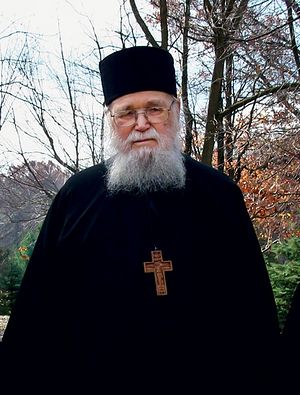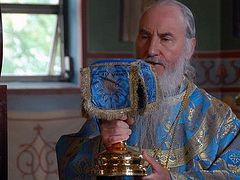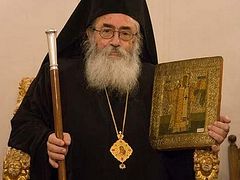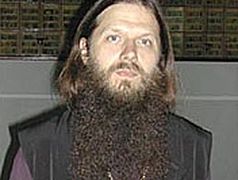[Interviewer] Father, you said earlier that Father Theodosius practiced hesychasm. Did you learn the Jesus Prayer from him?
No. He never talked with me about the Jesus Prayer. I learned the formula from the director of the seminary, Archimandrite Chezarie Paunescu, who later became bishop of Galatsi. Another great monk, he was a professor of Latin and Greek languages and culture. He was very stern and correct, almost legalistic. You had to execute your obligations and read your prayers even if you did not understand anything. He used to say, "Asceticism is something to be practiced. Prayer is very important even if you say it mechanically because the understanding comes later. The Holy Spirit works later in you after you are well established in your ascetic endeavors." This was his method. He told me to say the Jesus Prayer if I did not feel the presence of God. In my opinion he was a great pedagogue without being pedantic.
But you did not learn from him the Prayer of the Heart?
Yes and no. We used to ask him about the Jesus Prayer, and he said, "Do not test me. For a while it is enough to say it as often as you can." This is all I got from him. I did not know anything concerning the methods of saying the Prayer until much later when I read the Holy Fathers, and I found out that this simple prayer is not so simple; you need a special method, and there is whole theology in it based on the existence of God in your heart. Later from my reading at the Theological Institute I found out what the interior Holy Liturgy is. From the monks, I learned that it is a prayer like any other. I used to see them walking and moving their lips.
Father, do you think that the ascetic effort associated with the Prayer of the Heart should be the same for monks and for lay people?
The first step should be the Prayer, I mean the formula. If you repeatedly recite the Jesus Prayer, the rest comes naturally. Man cannot become dispassionate without falling on his knees and asking God for this grace, because everything comes by the grace of God. Attaining dispassion is not the result of personal effort, but it comes by the grace of God; so you must fall on your knees, see yourself as a sinner, and ask for God's help. Prayer and the purification of passions happen at the same time. I think that priority must be given to prayer. It is said that there is no pure prayer without first attaining dispassion. But I say that whether pure prayer or forced prayer, prayer must be the beginning of any spiritual work.
Father, let us resume the thread of your biography where we began to digress. So your life was divided between the Theological Institute and the Burning Bush Movement?
To be sincere, my life was somewhere else. I was not yet a monk, but I was attracted by the sweetness of a simple life.
However, did you develop a new understanding of monasticism when you learned more things about the Prayer of the Heart?
Yes, now the prayer stool that Father Theodosius of Cernica Monastery used, the reading from those big volumes from the library and the droning of the monks walking on the monastery's paths made more sense to me. Now I knew what they were doing. Because they did not walk in the refined heights of St. Gregory of Sinai, they could not express what they were doing. You know, many times there is a need for others to interpret you.
I am one of those who received a special blessing by Father John Kulegian. There is a special ritual to begin the Prayer of the Heart; it is like a little ordination. He laid his hand on my head and gave me the blessing to practice the Jesus Prayer. At the Burning Bush, we used to speak about breathing techniques when saying the Prayer, but I do not / think this has too much importance. Neither the blessing nor the breathing works magic. I rejected the methods because I found them to be too technical; they did not produce any results. So I started to pray as the Russian pilgrim—mechanically—because The Way of the Pilgrim was in vogue. At that time it was translated only into French, which was very accessible to Romanians. There was no consistency in my prayer; I did not have the patience. I did it when I could and when I had time What I found out is that if you are too preoccupied with methods, the Spirit disappears. It might be that I was too much influenced by my monks at Cernica. When Father Dionysius and Father Theodosius the hesychast learned of what The Burning Bush was doing at Antim Monastery, they smiled indulgently, saying "Mind you, they lecture about the Prayer of the Heart!" It was something new for them. How can you deliver lectures about prayer? Prayer is something to be practiced; you do not speak about it. It works mysteriously. And from them I know that a true spiritual father does not entrust to all his disciples this kind of prayer. It should be carefully controlled. So I was caught between two worlds: one was the world of the Burning Bush with the Russian method of St. Paisius Velichkovsky, a kind of democratization of hesychasm which said this Prayer should be for all; and the other world, less spectacular, but I think more profound—the attitude of the Cernica monks.
Nevertheless, Father, the Burning Bush constituted a great spiritual revival in the rigid intellectual Romanian society. I would say that hesychasm was extricated from the secrecy of monasteries and given to society in general; everyone needs salvation, everyone should put forth the effort of doing this Prayer.
First of all, there are people who save themselves without knowing anything about the Jesus Prayer. What was good about the Burning Bush was the fact that lay people, and especially university intellectuals, started to understand that spiritual life goes beyond the limits of culture. Even today if you go to Romania, you will find a second generation practicing the Jesus Prayer; but everything started under the influence of the Burning Bush Movement. I do not deny the legitimacy of lay people who practice hesychasm; however, I personally am more attached to the Greek fathers' way of thinking for the need of at least a little initiation, a mysterious discipline.
Father, if this work is restricted to only a select group, how can an entire nation become spiritual— if only certain hermits know about this special grace of God? Is it not proper that the mystery of spirituality should descend from the monasteries, from the caves where those who live in Christ are hidden, into the middle of everyday society? I think they should be a living example; even if we lay people cannot reach their level we should taste at least a little bit of this special grace of God. Did not God call all of us to perfection, saying: Be perfect as your Father in heaven is perfect. (Mt. 5:48)?
Do you know what the monks implied when they asked for more supervision in the practice of hesychasm? They did not say that we should not recite the Jesus Prayer; all the prayer books printed in Romania have it on the first page: O Lord Jesus Christ, Son of God, have mercy on me a sinner." And there is a note there saying that this prayer can replace any other prayer. So the monks recommended it and the Church recommended it. What the monks could not accept was too much intellectualization; a whole theology has been created around this Prayer—too much discussion instead of simply practicing it. They were for simplicity; prayer is life, not theory.
It is true that it is a temptation to theologize the Sacraments too much. Almost all those who live the Prayer say that you cannot acquire the spirit of prayer if you do not empty your mind of concepts, of ideas, of thoughts.
And this takes extraordinary effort.
It is true that you cannot reach that simplicity you are speaking about other than with the help of the Holy Spirit. But the mind does not let itself be convinced to only ceaselessly recite this Prayer. The mind is inclined to search like a spy and must be kept in rein. Without prayer the mind goes too far and you cannot keep it under control. In addition, the Prayer of the Heart is a work of the Holy Spirit made within the intellect; it is like a sanctification of the intellect.
I think that the Burning Bush dealt too much in theory, but there was no other way for them because those people were intellectuals. They wanted to understand God before loving Him, before asking Him something in prayer. Monks in the monastery are not intellectuals. Even if some of them are, they left their minds at the gate of the monastery; they understand God because they love Him and in turn their understanding is enhanced by this love. The intellectuals of the Burning Bush started to develop a whole theology around the Prayer of the Heart, which without doubt has its own place; otherwise The Philokalia would not have been written, nor would any writings of the Holy Fathers have been left to us in this generation. But monks in the monastery are practical people; they condensed the whole theology into the practice of prayer.
Father, I see here that we are speaking about two ways of achieving the knowledge of God.
And I think we should accept both of them.
Each one leads to a different result. You cannot uproot from an intellectual the inclination to think; you cannot change the structure of his mind.
When St. Nichephorus the Ascetic says, "First of all, brothers, let us turn to ourselves," for the simple monk this is something practical but for an intellectual it is a complicated thing, because he is complicated.
For an intellectual, this means self-denial—to give up everything you have done and thought until then and to become naked; only then can you begin your journey toward God.
This is why the intellectuals, the university professors who came to the Burning Bush, broke totally with the idolatry of their personal creations. They had to reconsider human culture from a spiritual perspective....
Father [Dimitru] Staniloae confessed that his time in prison was the first time he could pray without ceasing, with the mind in the heart.
I cannot say that I experienced prayer as Father Staniloae, but what I do know is that we will never reach the same spiritual level of life as in Communist imprisonment. There was no pencil, no paper, no T.V., nothing; especially in solitary confinement, you could not even look through a window. There was no exterior horizon, nothing but the four walls of your cell. You had to go somewhere; you had to find an inner perspective, because otherwise you would truly go j crazy. I'm ashamed to say that I was forced to find myself in prison. I had some ideas about prayer because I came from the Burning Bush Movement, but it was mostly theory about what prayer is; but there in those difficult moments I confess that I started to recite the Jesus Prayer and practiced it intensely. Only then was I able to discover how beautiful the interior life of man is. I liked it very much. A couple of months before I discovered this, I thought that I would go crazy because the solitude was a total break from the world with which I had been so much involved. And you know that our culture is oriented outside ourselves; it is a cosmological knowledge directed toward existence outside ourselves. Now I needed a method to find myself, to liberate myself from the slavery of the books, because there were no books there. It is not an exaggeration to say that in freedom we become slaves of the books; we do not have time even to know who we are because we are made out of quotations....
What was your spiritual life there like?
I told you I did not reach the level of St. Paul, to say that Jesus is my personality, He is in the center of my heart, He is the seal of my authentic personality—I could not say that. However, I reached the level of feeling the presence of God in a vivid way; that is, since that time, I never saw or imagined God in my prayers outside of myself, and I hope I will never see him in a "vision" outside myself while I am in this world. I hope to remain with the true understanding of God, not with illusions. But I have the feeling of His presence. When God speaks to you He does not use material words but brings you joy. I experienced such joys in prison, I could not detach myself from them. I was never interested when they brought me food or water...
In any case, the fact that these men [of the Burning Bush movement] strove to find the Romanian formula of hesychasm is important for us. They studied intensely the Paisian manuscripts from Neamt, the testament of Elder Gheorghe of Cernica, and the chapters from The Philokaia written by Elder Vasile of Poiana Marului. They emphasized in their studies the character integral to and harmonic with Romanian hesychasm. In the tradition of Carpathian asceticism, there is no place for self-mortification, belts with nails, self-flagellation, not even the obligation of celibacy. There are very many married people in Romania practicing the Prayer of the Heart. The exercise is purely spiritual.
Today, when our country wants to follow the way of Democratic reform, what if we leave aside all arguments, all accusations, all desire for revenge and all the demagogic discourses which, in fact, are nothing else than our own weaknesses and inability to enter within the inner temple of the Holy Spirit which is in us? We can defeat Satan only with God, Who is within us. Let us follow the way of the great ascetics of our people in these moments of crisis, because only from this will our salvation come.




